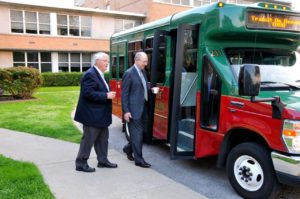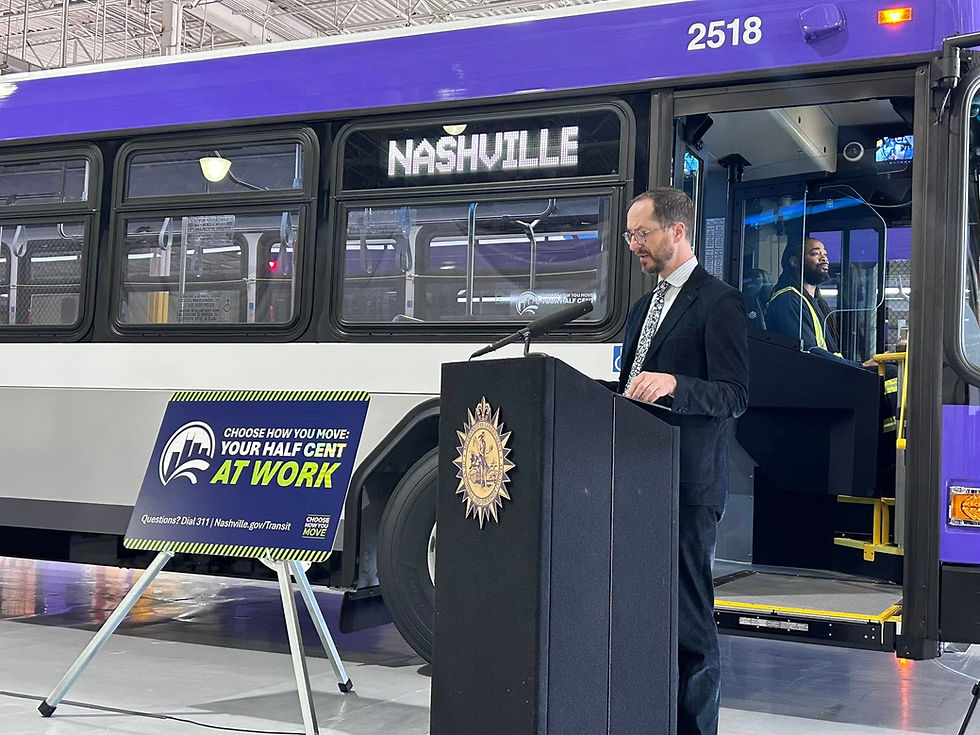Franklin Takes A Bold Step Into the Future with Transit
- jessicadauphin
- Sep 15, 2025
- 3 min read
When it comes to building a vibrant, connected, and sustainable community, transit plays a starring role. Right now, one of Middle Tennessee’s fastest-growing cities is taking bold steps to plan for its future.
The City of Franklin has launched a comprehensive transit study that will recommend investments and improvements for the next ten years. The study, led by Benesch, brings together voices from across the community and region, including Franklin and surrounding city departments, such as Thompson's Station, the Franklin Special School District, GNRC, the TMA Group, TDOT, and The Transit Alliance, all of which serve on the Technical Advisory Group. The final report is expected in mid-2026 and will be a roadmap for how Franklin can expand and strengthen its mobility options.
This effort is exciting because Franklin isn’t just any city. Its population is projected to grow by 15% in the next three years alone. It’s the economic engine of Williamson County. A county with the highest household income in Tennessee, between $131,000 and $177,000, a median home price of between $875,000 and $910,000, depending on the source, and home to several Fortune 500 companies, reflecting its status as a hub for business growth and innovation. Franklin is also a cultural and recreational destination, beloved by history buffs, foodies, and outdoor enthusiasts alike. With so much to recommend it, Franklin’s commitment to mobility is a natural next step.
Why Transit Matters Here
Demand for transit is already growing. Ridership on Franklin Transit Authority’s fixed-route system has increased significantly over the past three years. That trend makes one thing clear: when transit is available and reliable, people use it.

Investing in infrastructure and services now will only increase that demand, ensuring more people can access jobs, schools, healthcare, and recreation without being limited by traffic or parking.
And the benefits could extend beyond Franklin. Williamson County’s I-65 corridor is the only one in Middle Tennessee with a nearly exact reciprocal commute. Just as many commuters leave Williamson for Davidson as leave Davidson for Williamson each day. That means regional connectivity between the two counties isn’t just important — it’s essential.
Currently, the regional express bus doesn’t align with that reality. Riders can get from Franklin to Downtown Nashville in the morning, and back again in the evening, but there’s no way to do the reverse. This study, although local in scope, opens the door to big-picture conversations about how to revise and improve regional services, ensuring that opportunities flow in both directions.
Ways to Get Involved
Franklin’s study will include opportunities for residents, businesses, and stakeholders to share their voices. That input matters. Here are a few simple ways to stay engaged:
Be on the lookout for community engagement opportunities in Franklin over the next month. These will be your chance to weigh in on future mobility improvements.
Join The Transit Alliance’s newsletter list to stay informed about the study and broader regional transit efforts.
Follow the City of Franklin and The Transit Alliance on social media for updates, event announcements, and opportunities to participate.
Looking Ahead
Franklin’s leadership on this study demonstrates what’s possible when a regional city prioritizes transit and mobility. It’s a chance to build on momentum, meet rising demand, and design a system that supports both local riders and regional commuters.
At The Transit Alliance, we’re honored to be part of this process and excited to see how Franklin’s choices will shape the future of mobility for Williamson County and the entire Middle Tennessee region.
A more connected, accessible, and sustainable future is within reach. And Franklin is leading the way.




